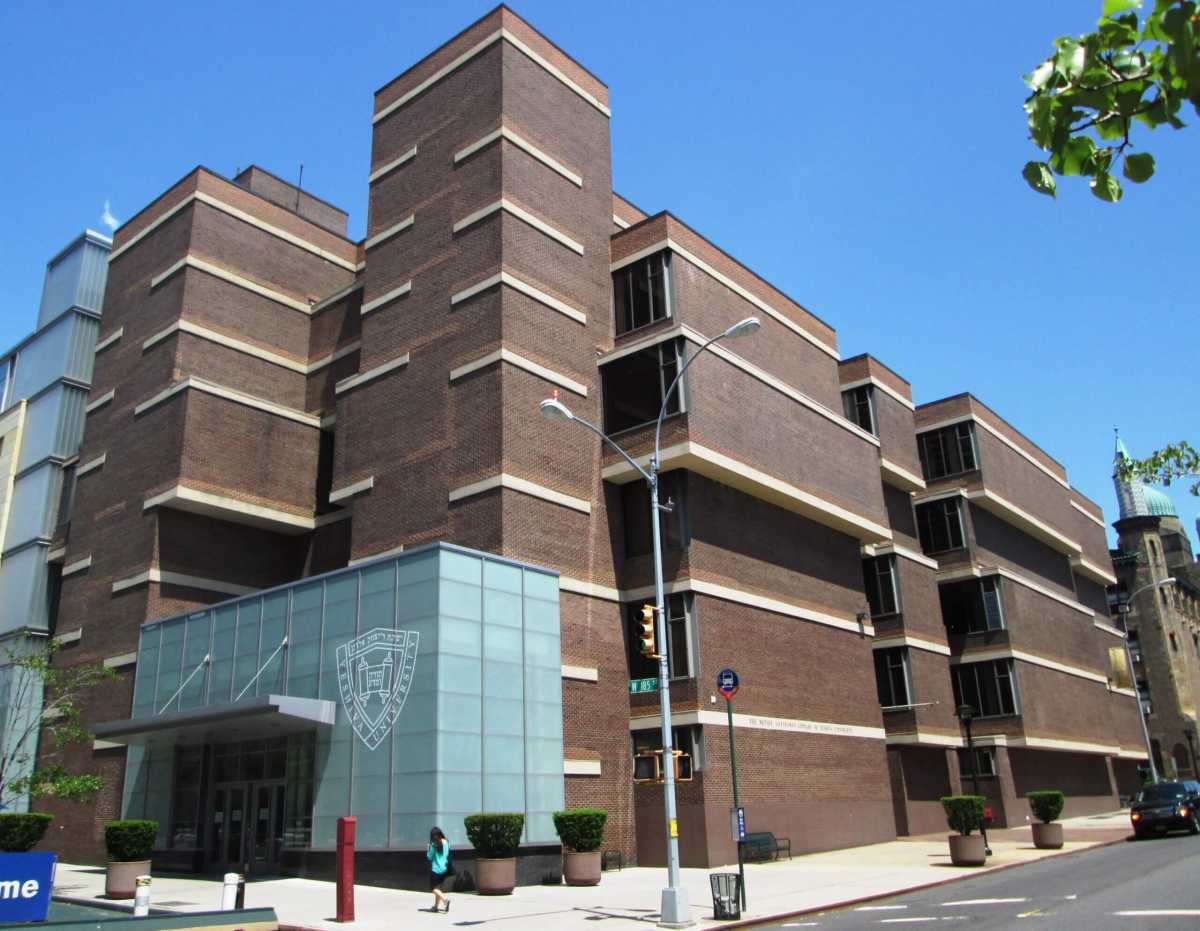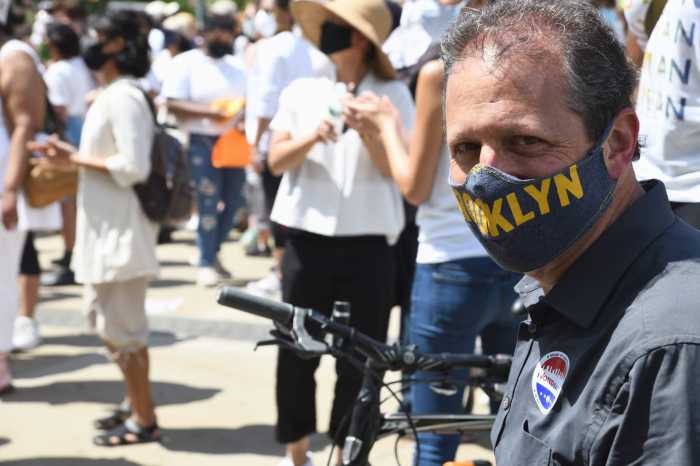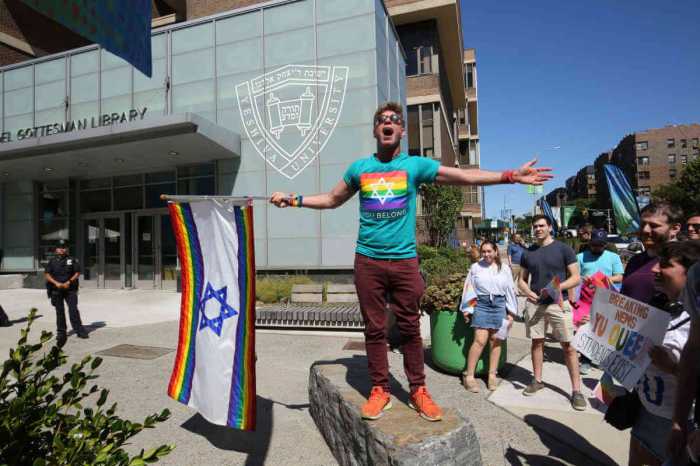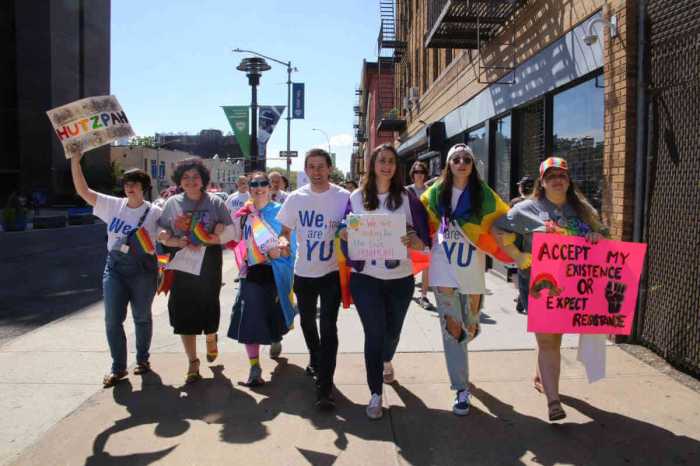Several New York State assemblymembers accused Yeshiva University (YU) of “scorched earth legal tactics” by demanding personal information from students in its latest move against members of the university’s unrecognized LGBTQ undergraduate student group, YU Pride Alliance.
In a March 8 letter to the university’s board of trustees in care of the school’s president, Rabbi Dr. Ari Berman, five State of New York lawmakers accused the university of demanding an “onerous and unprecedented amount of personal information,” amounting to an invasion of privacy of YU Pride Alliance members. The lawmakers asked for the board to protect the queer student group members and other queer and ally undergraduate students.
The university’s attorneys “demanded from each student their Federal and State Tax Returns and unrestricted access to their mental and physical health records, including psychology, psychiatric, and social work treatment, employment, and educational records,” according to the letter. The note was signed by Assemblymember Alex Bores of Manhattan’s District 73 and out Assemblymembers Tony Simone of Manhattan’s District 75, Deborah J. Glick of Manhattan’s District 66, Daniel J O’Donnell of Manhattan’s District 69, and Jessica González-Rojas of Queens’ District 34.
“The possibility that students have not made their sexuality, gender identity, or allyship with the LGBTQ community public out of fear of retaliation places them at potential emotional and physical harm, and they are justified in wanting to withhold this information to protect themselves,” the letter noted.
YU graduate students who have a separate queer student group are not affiliated with or affected by the YU Pride Alliance lawsuit or harassment.
“The goal is clearly to punish the students and their families because of who they are and because they choose to fight for equality,” the assemblymembers wrote, calling the university’s tactics “morally and ethically reprehensible and… anathema to the values of our state.”
There are concerns that the university and its law firm, Becket Fund and Kaufman Borgeest & Ryan, are retaliating against YU Pride Alliance members suing the school for discrimination following city and state leader’s recent threats of risking millions of dollars in public funding.
“This latest legal move by President Ari Berman and the University feels like an intimidation tactic,” wrote Tai Miller, one of the YU Pride Alliance plaintiffs suing the university, in a statement to Gay City News. He echoed the assemblymembers’ statement, saying, “There is no legitimate legal reason for students to provide such personal documents.”
“My sincere hope is that the university rescinds this legal tactic and allows LGBTQI+ students to form their own club just like every other student on campus,” Miller said.
In a March 6 letter to the university, New York City Comptroller Brad Lander called on the school to recognize the undergraduate queer student group or risk losing millions of dollars of the city’s funding. Lander’s letter followed a January 11 letter by state assemblymembers questioning the university’s discriminatory actions that called into question millions of dollars in state funding the university received.
The university’s lawyer, Eric Baxter, vice president and senior counsel at Becket, a law firm specializing in religious freedom cases, told NY1 in a statement that the assemblymembers “are being used and misled by those who resort to publicity stunts because they know the lawsuit ultimately will not prevail.” He added that “well-meaning politicians are kindly asked to learn the facts before attacking Jewish education.”
Addressing the requested documents, Baxter said, “the university’s requests for documents quantifying plaintiffs’ claimed injuries are standard in such cases and made necessary by plaintiffs’ attorney.”
However, the university wanted to bypass the discovery process, but YU Pride Alliance’s attorney Katie Rosenfeld refused the offer. Rosenfeld accused the university of misrepresenting the legal facts.
“Discovery is not optional,” Rosenfeld told NY1, stating that the Becket Fund for Religious Liberty “misstate[d] the basics of legal practice in New York.” She explained that the “Appellate Division remitted the case back to the trial court for discovery and trial.”
The case
The Alliance filed the lawsuit, Yeshiva University v. YU Pride Alliance, under the New York City Human Rights Law in April 2021 after more than a decade of being denied formal recognition by the university. In justifying the refusal to recognize the group, the university said it would be “inconsistent with the school’s Torah values and the religious environment it seeks to maintain.”
In June, the New York County Supreme Court ruled the university had to recognize the Alliance. In September, the United States Supreme Court temporarily blocked the lower court’s order, then days later reversed course in response to an appeal filed by the university in August. The university responded by suspending all student clubs ahead of the Jewish holidays.
In a fact sheet published by the university about the case and the controversy, the school denied halting all student clubs. Days later the Alliance offered a compromise to the university while their case moves through the courts. It was the Alliance’s attempt to allow their fellow students to resume club activities on campus. In October 2022, the university responded by launching what it described as its own LGBTQ undergraduate student group, which has been criticized as a “sham” club.
The latest development marks another twist in the years-long friction between the school and LGBTQ students. Gay City News reported university officials revoked the school’s Democratic Club’s official status days after the We Too Are YU march and rally in 2019.


































